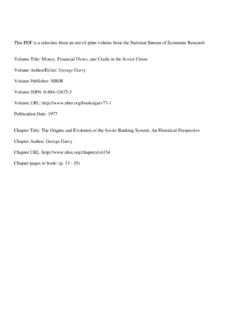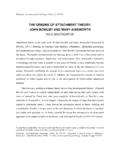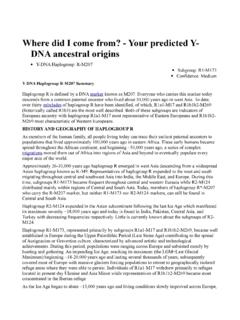Transcription of John Paul II and the “New Evangelization”: Origins …
1 1 John Paul II and the New evangelization : Origins and Meaning Richard Rymarz Abstract: The key reference point for the new evangelization is the encyclical letter, Redemptoris Missio of Pope John Paul II. In order to better understand this document this paper argues that it needs to be discussed in the light of a historical continuum starting with the documents of the Second Vatican Council and continuing through postconcilar writings such as Pope Paul VI s apostolic exhortation, Evangelii Nuntiandi. The new evangelization is John Paul s conception is a response to new cultural realities. In this regard, it an example of the Catholic understanding of tradition as both conserving the essentials of the past as well as responding to new situations and challenges.
2 In John Paul II thought the new evangelization expresses a Pauline emphasis on inner conversion to Christ as a basis for outreach to others and to the wider culture. Introduction or Pope John Paul II, this new phase of evangelization was not new in the sense of being an innovation that moved beyond the Church s traditional mission of proclaiming the Gospel to all nations. However, a renewed focus on evangelization emerged from the teachings of the Second Vatican Council, and in the social reality of many countries such as Pope John Paul II identified three elements in the Church s commitment to evangelization . The first was the essential missionary focus of the Church on proclaiming the Gospel of Christ to those who have not 1 Avery Dulles.
3 The Reshaping of Catholicism: Current Challenges in the Theology of Church, (San Francisco: Harper and Row, 1988), 144-149. F2 heard This remains the proper, or classical, sense of the term. The second element focused on those with strong Christian affiliation who were fervent in their faith and Christian living .3 However, there was a third, intermediary element, it is from here that the new evangelization takes its meaning. Particularly in countries with ancient Christian roots, and occasionally in the younger Churches as well, where entire groups of the baptized have lost a sense of the faith, or even no longer consider themselves members of the Church, and live a life far removed from Christ and his gospel.
4 In this case what is needed is a new evangelization or a re- evangelization .4 The Pope s understanding of evangelization is encapsulated in Redemptoris Missio. In his view evangelization is fundamental to the Church s mission and has its Origins in the Trinity It is always focused on faith in and a personal encounter with Christ, and this results in a profound experience of conversion. 6 evangelization is the task of the entire Church and is concretely located in the activity of the local Church. 7 Finally evangelization seeks to engage and transform culture, takes place in a variety of contexts and should, therefore, be creative in a bold range of expressions so as to address new In order to better understand the teaching contained in Redemptoris Missio.
5 It is necessary to explore the document and how it emerged from a renewed sense of evangelization first spelled out in the documents of the Second Vatican Council and developed especially by Pope Paul VI. 2 John Paul II, Encyclical Letter, Redemptoris Missio, in J. Michael Miller (Ed) The Encyclicals of John Paul II, (Huntington, Indiana; Our Sunday Visitor Inc, 1996). Church is used to signify the Catholic Church unless otherwise stated. 3 RM, 4 RM, 5 RM, 46. 6 RM, 41-49. 7 RM, 72. 8 RM, 32. 3 From Vatican II to Pope John Paul II S New evangelization Schindler argued that the intellectual Origins of the new evangelization can be traced to John Paul II s Christocentric reading of Gaudium et In the Pope s anthropology, each person is created in the image and likeness of God.
6 Thus, each one has inalienable rights and inviolable The fundamental task of the Church is to promote and defend this dignity at every opportunity. Dulles described this vision of John Paul II as a prophetic humanism, the central and unifying task of the Church, for John Paul II, is to rediscover and promote the inviolable dignity of every human person .11 Although many are immersed in cultures which do not value the transcendent, people of today cannot avoid profound the existential questions that emerge in their search for meaning and Their searching is rooted in their Origins as creatures of God. A sense of unease or incompleteness is part, therefore, of the human Human history can be seen, then, as a long tale of the search of people for answers about their existence, Origins , final destiny and, perhaps most urgently, a clear sense of how to live.
7 For many this search is unfulfilled, 9 Pastoral Constitution on the Church in the Modern World, Gaudium et Spes, in Austin Flannery (Ed), Vatican Council II. The Sixteen Basic Documents, (Northport, : Costello Publishing Company, 1996). David L. Schindler, Reorienting the Church on the Eve of the Millennium: John Paul II s New evangelization , Communio, 24(Winter), 1997, 729-779. For a sense of how John Paul II interprets Gaudium et Spes see John Paul II, Crossing the Threshold of Hope, (Alfred A. Knopf: New York: 1994), 48-50. 10 GS, 12. Dziwisz, remarks that John Paul contribution to the Council was [the] reassertion of the centrality of the person within a robust Christocentric framework.
8 Stanislaw Dziwisz, A Life with Karol: My Forty-Year Friendship with the Man Who Became Pope, (New York: Doubleday, 2007), 19. 11 Avery Dulles, The Prophetic Humanism of John Paul II in Church and Society: The Laurence J. McGinley Lectures, 1988-2007, (New York: Fordham University Press, 2008), at 142-156, 143. 12 Kenneth L. Schmitz. At the Center of the Human Drama: The Philosophical Anthropology of Karol Wojtyla/John Paul II, (Washington, : Catholic University of America Press, 1993); John Saward, Christ is the Answer: The Christ Centred Teaching of Pope John Paul II. (Edinburgh: T&T Clark, 1993). 13 Robert F. Harvanek. The Philosophical Foundations of the Thought of John Paul II , in John M.
9 McDermott (ed), The Thought of Pope John Paul II: A Collection of Essays and Studies. (Rome: Editrice Pontifica Universita Geregoriana, 1993), 1-23, esp. 2-4. 4 no more so than in the past few centuries when human questioning has often been resolved in violent and contradictory ideologies. For Pope John Paul II, these existential and unavoidable questions find their ultimate resolution in an encounter with the living Christ, who is preeminently experienced in communion with the Church. In Gaudium et Spes this is expressed as Christ uniting himself in some way with every human being. 14 The presence of Christ, therefore, reaches into every aspect of human culture because of the divine identity of each person.
10 To evangelize, then, is not to impose, but seek to address a profound human need, to prove something that is lacking but which is sorely needed. One of the tasks of the Church is to proclaim this message in many situations where culture is seen in far more positivistic terms and where discussion of God is pushed to the margins of public In its witness to Christ, the Church has a cultural role of synthesis in its effort to relate Christian faith to particular cultures. Nevertheless a genuine synthesis has yet to be Indeed, in many places, the dominant cultural forces push people further away from the This is particularly the case in many western, developed countries despite their ancient Christian traditions, and even in countries such as Australia, despite a period of unprecedented missionary growth in previous centuries.







